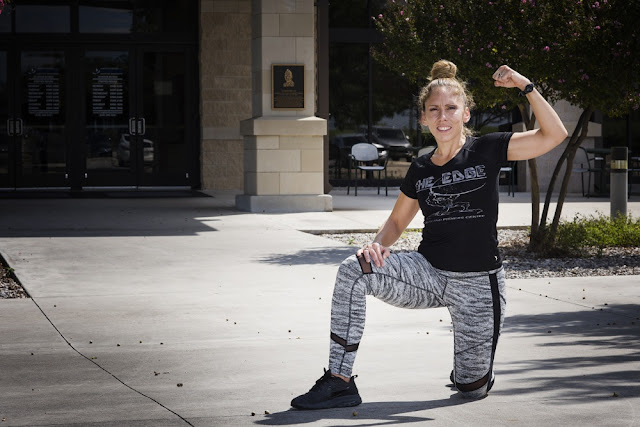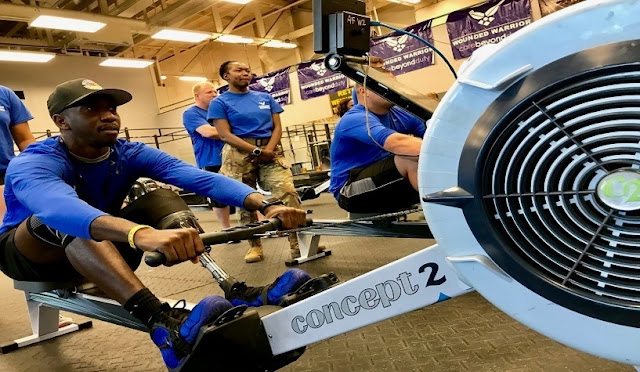Cancer survivor says knowledge is power

Story by Airman 1st Class Anne McCready
47th Flying Training Wing Public Affairs
The solid gym doors swung open, spilling the warm, Texas evening light across the Losano Fitness Center carpet.
A woman with a lively step marched across the gym lobby down the hallway greeting the people she saw by name. She turned right into a room with mirrors, colorful mood lamps and a light, hardwood floor. A handful of women greeted her as they stretched and warmed up for the class.
“Hello, ladies!” she said, plugging her phone into a speaker. A lively beat began to pulse through the room as the Zumba class started.
Paloma Felan, a Zumba and spin instructor at Losano Fitness Center at Laughlin Air Force Base, Texas, is often seen by gym-goers as a fountain of energy and positivity.
Felan exudes enthusiasm and a willingness to help others. For those who stop and ask, she does not hesitate to slow down a moment and share her own experience battling a disease that would have taken her life if given the chance.
She knew she had a family history including cancer and being overweight. To counter this, she took an interest in leading a healthy lifestyle. Ever since she was a teenager, Felan valued staying busy and exercising.
When aerobics was becoming popular in the 1990’s, she became enthralled with it. As soon as she graduated high school, she jumped at the opportunity of becoming an aerobics instructor and earned her qualification.
Felan said she soon discovered she could only teach so many classes, which did not provide enough for the healthy lifestyle she wanted. She recognized true fitness requires more than working out — it also takes eating right, and nourishing the mind and spirit.
She began working at a grocery store to supplement her fitness job, and she has continued with both jobs for 25 years.
One evening in the summer of 2017, Felan flexed in front of her mirror after a gym workout, inspecting her progress and seeing which muscles needed more symmetry and balance.
“I noticed I had a lump on my left breast, and the nipple was slightly inverted,” Felan recalled. “The fact that they looked different was the biggest sign something was wrong. Everyone I knew told me, “No, it’s a caffeine deposit—women get them all the time before their period.”
However, Felan was doubtful because her aunt had breast cancer, her father had prostate cancer and even her brother had cancer behind one of his eyes when he was a 1-year-old. She wasn’t about to take a chance.
Felan was anxious because she could tell something was off, so she took action and scheduled a mammogram. From there, she began her search for multiple opinions. They found the results were serious and recommended she go to San Antonio for confirmation.
“I ended up going to three different doctors,” Felan said. “Which is good because even doctors are human beings and can make mistakes.”
After the multiple mammograms and ultrasounds, a biopsy was scheduled. Its results returned from the lab Aug. 8, 2017, and the doctor diagnosed Felan with stage one breast cancer.
“When I was told by the doctor, ‘I have some good news and some bad news, your right breast is good—your left has cancer,’ I was taken aback,” she said. “But I just replied, ‘Fix me.’ That’s all I said.”
Even though Felan discovered her cancer early on, she chose to err on the side of caution and asked her doctor for a double mastectomy since she knew breast cancer was notorious for spreading from one side to the other.
On Oct. 11, 2017, she had the surgery.
Leading up to the double mastectomy, Felan underwent mammograms, ultrasounds, a biopsy, MRI, CT scan, and chest x-rays.
“They don’t put you under the knife right away, and that’s why you have to move fast,” She said. “They’re going to run a lot of tests before they touch you.”
Felan was anxious throughout the months of testing, afraid the cancer would spread. However, the doctors and nurses reassured her saying the important thing is that Felan caught it early on.
“So what did I do?” Felan asked. “I stayed busy. That’s my number one tip to anybody going through a health crisis. If you recoil, stay home, or cry, you’ll become sicker.”
She began going to appointments for the cancer. At these appointments in the oncology waiting area, Felan saw other people living with cancer.
“There were some people who looked not-so-sick and others who looked very, very sick,” Felan described. “Everybody would ask questions, and everybody wanted to know why I was there because I didn’t look sick.”
Felan knows of many women who suspected they have cancer but waited too long to get medical help because they were embarrassed to go to the doctor, take off their clothes or to have people touch them.
“You have to get it checked,” she said. “It will get worse if you don’t. When you feel something or notice something’s not right, run.”
Since she chose a double mastectomy, she had also opted for reconstructive surgery.
“There are a lot of females who will go through chemo and radiation before they have their breasts removed, because they value their breast as a part of who they are,” Felan observed. “It’s sad that sometimes women feel like they’re just a piece of breast. You’re more than that.”
The procedure Felan went through to keep her volume was only possible because she had caught the cancer early, but also because she had been working out for three decades.
The surgery removing her breast tissue and ensuring the new tissue was accepted in her chest took 17 hours. The anesthesiologist was amazed how well she was able to take that much time under surgery.
“I think God prepared me,” she said. “In those few months, my 25 years of training came in handy. There are a lot of females all over the world the doctors can’t offer the option of reconstructive surgery to because they aren’t fit or healthy enough for the additional surgery.”
Doctors told Felan the healing process would take six months to a year. They said she wouldn’t be able to raise her arms for a long time.
Felan was not one to take a hit. When she was told how long it would take to recover, she replied with a gusty, “Hell no — watch me.”
“For four months I really couldn’t move,” Felan recalled as she crouched over to illustrate an elderly person using a walker. “I was walking like a 90-year-old person, and I slept in a recliner at a 45-degree angle.”
Her steps to recovery were small at first. During the first four months afterward, she walked. Even though it was difficult, she would keep walking.
While Felan was healing, much of the help she received came from her sister and sister-in-law.
“I know what it is to lose mobility,” she stated. “I like working, I like moving. It’s horrible to depend on others for everything.”
Even so, it took Felan a mere four months before she began rediscovering her norm. She’s developed a heightened value for the small things in life like being able to stand up tall, take long showers, and go to work.
Sitting next to the other oncology patients, Felan knows what cancer for her could have been. She saw their steady and often quick decline. She saw their loss of hair and the pain in their eyes. She knows what it is to have cancer and what it is to start the fight before the disease does.
Felan continues the fight against cancer by being aware and making others aware as well.



Comments
Post a Comment